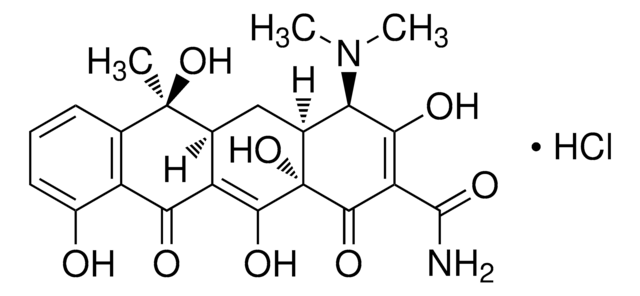19-3900
Methyl Orange
SAJ first grade
Sinonimo/i:
4-[4-(Dimethylamino)phenylazo]benzenesulfonic acid sodium salt, Acid Orange 52, Helianthin, Orange III
About This Item
Prodotti consigliati
Grado
SAJ first grade
Forma fisica
solid
Disponibilità
available only in Japan
pH
3.0-4.4, pink to yellow
Stringa SMILE
[Na+].CN(C)c1ccc(cc1)\N=N\c2ccc(cc2)S([O-])(=O)=O
InChI
1S/C14H15N3O3S.Na/c1-17(2)13-7-3-11(4-8-13)15-16-12-5-9-14(10-6-12)21(18,19)20;/h3-10H,1-2H3,(H,18,19,20);/q;+1/p-1/b16-15+;
STZCRXQWRGQSJD-GEEYTBSJSA-M
Cerchi prodotti simili? Visita Guida al confronto tra prodotti
Avvertenze
Danger
Indicazioni di pericolo
Consigli di prudenza
Classi di pericolo
Acute Tox. 3 Oral
Codice della classe di stoccaggio
6.1C - Combustible acute toxic Cat.3 / toxic compounds or compounds which causing chronic effects
Classe di pericolosità dell'acqua (WGK)
WGK 3
Punto d’infiammabilità (°F)
Not applicable
Punto d’infiammabilità (°C)
Not applicable
Dispositivi di protezione individuale
Eyeshields, Faceshields, Gloves, type P2 (EN 143) respirator cartridges
Certificati d'analisi (COA)
Cerca il Certificati d'analisi (COA) digitando il numero di lotto/batch corrispondente. I numeri di lotto o di batch sono stampati sull'etichetta dei prodotti dopo la parola ‘Lotto’ o ‘Batch’.
Possiedi già questo prodotto?
I documenti relativi ai prodotti acquistati recentemente sono disponibili nell’Archivio dei documenti.
Il team dei nostri ricercatori vanta grande esperienza in tutte le aree della ricerca quali Life Science, scienza dei materiali, sintesi chimica, cromatografia, discipline analitiche, ecc..
Contatta l'Assistenza Tecnica.






